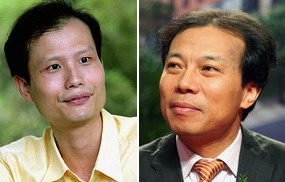Society
Former Microsoft China chief fights back
By Wang Huazhong and Zhu Zhe (China Daily)
Updated: 2010-07-07 07:29
 |
Large Medium Small |
BEIJING - Former president of Microsoft China Tang Jun on Tuesday sought to dispel a rumor that he faked his academic credentials in the United States after remaining silent over the matter for the past five days.
"I've never said I graduated from the California Institute of Technology (CIT). I only said I had done some research there," said Tang, the current president and CEO of the New Huadu Industrial Group.
"Instead, I got my doctors degree at the California-based Pacific Western University," he told China Daily.
Tang's remarks came after Fang Zhouzi, who is known as a "science cop" for battling against pseudoscience and academic misconduct, accused Tang of fabricating a doctoral degree from CIT, the ownership of two patents and entrepreneurship early in his career in the US.
"All these are false accusations," Tang said on Tuesday while commenting on the matter to China Daily, State broadcaster CCTV and China National Radio.
"He (Fang) is so eager to become famous that it drives him crazy. Should I show him my marriage certificate if he said it's faked? Should I present him with my passport if he said it's faked?" Tang asked.
|
|
Later the same day, Tang said on his Sina.com microblog that his lawyer has suggested launching a lawsuit against Fang, either in China or the US.
Starting on July 1, Fang began to make accusations against Tang on his own Sina.com microblog, saying that Tang had written in his book My Success Could Be Duplicated that he received a doctoral degree in computer science from CIT and owned the copyrights to two patients in the US.
Fang said he checked the names of graduates from CIT's computer science department and failed to find the name Jun Tang, the name that Tang used when he entered Microsoft in 1994.
Fang said he also checked the patent database of the US Patent and Trademark Office since 1976 and found that the two patents Tang claimed to own - a rating system for karaoke bars and a machine for producing photo stickers - are actually owned by other people.
After Tang responded that he graduated from Pacific Western University, Fang went on the attack again on Tuesday, claiming the university had been closed by the US government in 2006 for selling degrees.
According to Wikipedia, Pacific Western University had two campuses in the US. The one in Hawaii was closed in 2006 following a lawsuit filed by the State of Hawaii, which has taken legal action against more than 66 unaccredited schools since 2000.
The other campus, based in San Diego, California, was renamed the California Miramar University (CMU) in 2007 after operating as the Pacific Western University (California). It is a nationally accredited private institution of higher learning, Wikipedia said.
Fang also said that despite Tang not saying in his book that he had received a doctoral degree from CIT, the claim appears in the e-version, which is available online.
In his defense, Tang explained that Pacific Western University (California) is a "fourth-tier university". He told CCTV: "It was not a great honor for me to obtain a doctoral degree there. Therefore, I didn't include that information in my book."
However, he was unable to explain why the e-version of his book, as well as most of his CVs on the Internet, all stated that he had obtained his doctoral degree from CIT.
In regard to the claims over the patents, Tang said he developed the theory, software, hardware and applications for the karaoke machine.
"They are my original and professional inventions. I know the theory better than anyone. It's all in my brain."
When asked whether he could back up his claims, Tang paused and said he would try to do so, though it was 17 years ago.
However, netizens do not seem to be bothered about where Tang actually achieved his degree or if he owns patents.
By Tuesday night, about 76 percent of 4,760 respondents to an online survey on sohu.com said they consider a person's abilities to be of greater importance than academic credentials, while less than 1 percent thought otherwise.
Xu Fan contributed to this story
